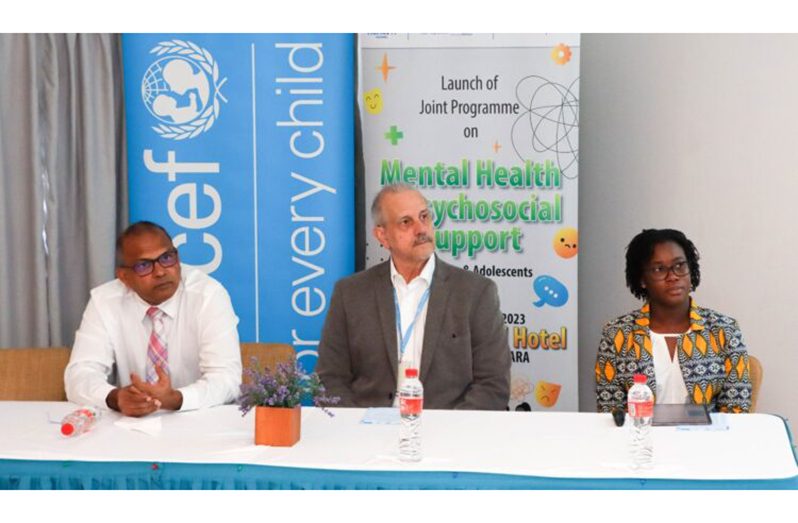By Trina Williams
AIMING to ‘destroy’ the stigma associated with mental health, Minister of Health, Dr. Frank Anthony, on Friday, announced that there is a national strategy in the works to not only curb the rising issue but to also give Guyanese, especially children and adolescents, the help they need.
These remarks were made during the kick-off session of the Joint Programme on Mental Health and Psychosocial Support for Children and Adolescents at the Grand Coastal Hotel.
This programme is a collaboration between the Pan American Health Organisation (PAHO) UNICEF Guyana and the Ministry of Health.
“This is a big paradigm shift from what we used to do,” the health minister said as he reflected on the “outdated” approaches that will be cast aside in order for the new and modern measures to step in.
With their feet on the gas pedal, the minister said that a comprehensive national strategy on mental health will be implemented to achieve the goal.
“We want to have a comprehensive national strategy on mental health and make sure that what is captured in the law, we now have in our mental health strategy,” he stated.
Among several of the core principles being sought on the journey to redefining how mental health is treated, Dr. Anthony said that they are aiming to deinstitutionalise patients who were previously institutionalised.
“The principle now is not to keep people in institutions for prolonged periods but to keep them when it’s necessary… and once treated and they’re stabilized, they can go back home and they can function like normal individuals. There’s nothing stopping them,” he related.
The minister then made the call to eliminate the culture that surrounds mental health and the way one who suffers or had suffered from any condition is perceived in the public domain.
Secondly, he said that mental health will be incorporated with primary healthcare and a lot of primary care physicians have been trained to do some of the basic diagnostics.
Next, are safe spaces and according to Dr. Anthony, “We want to have preventative centres because people need safe spaces where they can go to have counselling, talk to someone who is able to adequately respond…”
OUTDATED LEGISLATION
Stressing that the government is tackling mental health in all angles and has been conducting a significant amount of work in the area, the minister stated: “Over the last two years or so, we start looking at our mental health legislation, some of which went back to 1934 when we had mental health ordinances in the country.”
Adding to this, he said that these pieces of legislation contain “outdated” terminologies which do not quite have a place in the modern world.
As he explained the number of works ongoing to help push Guyana in the right direction, he said: “We thought that the time is now. We have to change the legislation.”
He went on to explain that the legal aspects of the issue have already being executed.
Moreover, the health minister said that other implementations can play a major role in advancing the ministry’s goals.
One way of doing such, according to Dr. Anthony, is by rolling out an electronic health record system, which is already on their agenda.
He affirmed that the ministry is ready to embrace a more technological path that will aid in an efficient and confidential health sector.
Meanwhile, Irfan Akhtar, Deputy Representative of the United Nations Children’s Fund (UNICEF), Guyana and Suriname, expressed similar sentiments as the minister and reflected on how mental health is not deemed a priority in most countries. This culture, he said needs to change.
In his remarks, Dr. Luis Codina, a PAHO/WHO representative, commended the ministry for taking mental health seriously and even taking steps to establish a plan to tackle it.
ACTION PLAN
On the other hand, Cilandell Glen, Coordinator of the Adolescent Health Unit of the Ministry of Health, said that the joint programme forms part of a 10-year action plan.
“Guyana is the first country to actually have our kick start and actually start our joint work plan…so what the programme will seek to do is to bring the two organisations [PAHO and Ministry of Health] together and utilise the strength of both agencies to really build on mental health and wellbeing and provide psychological support to our adolescents,” she stated.
Glen added: “What we want to see in Guyana is that by 2025, the mental health unit and the adolescent health units of the Ministry of Health adopt a national children and adolescent mental health policy and accosted action plan which will focus not only on promoting mental health and wellbeing of our children and adolescents but also preventative and responsive mental intervention across the life course.”



.jpg)








